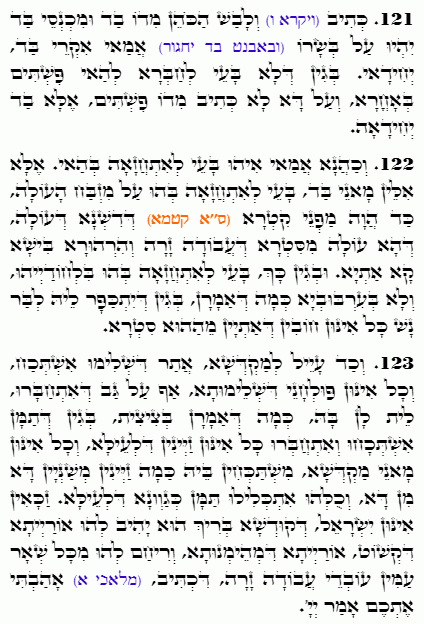Daily Zohar # 4614 – Kedoshim – I have loved you
Daily Zohar 4614

Hebrew translation:
122. וְלָמָּה הַכֹּהֵן צָרִיךְ לְהֵרָאוֹת בָּזֶה? אֶלָּא לְבוּשֵׁי הַבַּד הַלָּלוּ צָרִיךְ לְהֵרָאוֹת בָּהֶם עַל מִזְבַּח הָעוֹלָה, כְּשֶׁהָיָה מְפַנֶּה אֶת הַדֶּשֶׁן (הָאֵפֶר) שֶׁל דֶּשֶׁן הָעוֹלָה, שֶׁהֲרֵי הָעוֹלָה בָּאָה מֵהַצַּד שֶׁל עֲבוֹדָה זָרָה וְהִרְהוּר רַע. וּמִשּׁוּם כָּךְ צָרִיךְ לְהֵרָאוֹת בָּהֶם בִּלְבַדָּם, וְלֹא בְּעִרְבּוּבְיָה כְּפִי שֶׁאָמַרְנוּ, כְּדֵי שֶׁיִּתְכַּפְּרוּ לָאָדָם כָּל אוֹתָם חֲטָאִים שֶׁבָּאִים מֵאוֹתוֹ הַצַּד.
123. וּכְשֶׁנִּכְנַס לַמִּקְדָּשׁ, הַמָּקוֹם שֶׁשָּׁם נִמְצֵאת הַשְּׁלֵמוּת וְכָל אוֹתָן עֲבוֹדוֹת הַשְּׁלֵמוּת, אַף עַל גַּב שֶׁהִתְחַבְּרוּ, אֵין לָנוּ בָּזֶה עִנְיָן, כְּמוֹ שֶׁאָמַרְנוּ בְצִיצִית, מִשּׁוּם שֶׁשָּׁם נִמְצְאוּ וְהִתְחַבְּרוּ כָּל אוֹתָם הַמִּינִים שֶׁלְּמַעְלָה, וְכָל אוֹתָם כְּלֵי הַמִּקְדָּשׁ, נִמְצָאִים בּוֹ כַּמָּה מִינִים שׁוֹנִים זֶה מִזֶּה, וְכֻלָּם נִכְלְלוּ שָׁם כְּמוֹ שֶׁלְּמַעְלָה. אַשְׁרֵיהֶם יִשְׂרָאֵל, שֶׁהַקָּדוֹשׁ בָּרוּךְ הוּא נָתַן לָהֶם תּוֹרַת אֱמֶת, תּוֹרָה שֶׁל אֱמוּנָה, וְאָהַב אוֹתָם מִכָּל שְׁאָר הָעַמִּים עוֹבְדֵי עֲבוֹדָה זָרָה, שֶׁכָּתוּב (מלאכי א) אָהַבְתִּי אֶתְכֶם אָמַר ה’.
.
Zohar Kedoshim
Continued from previous DZ
#121
It is written,
Leviticus 6:3
“וְלָבַשׁ הַכֹּהֵן מִדּוֹ בַד וּמִכְנְסֵי בַד יִלְבַּשׁ עַל בְּשָׂרוֹ וְהֵרִים אֶת הַדֶּשֶׁן אֲשֶׁר תֹּאכַל הָאֵשׁ אֶת הָעֹלָה עַל הַמִּזְבֵּחַ וְשָׂמוֹ אֵצֶל הַמִּזְבֵּחַ.”
“And the priest shall put on his linen robe and linen undergarments, and he shall remove from the altar the ashes of the burnt offering that the fire has consumed and place them beside it.”
The question is asked, why is it called “linen” (בד), which implies “alone” or “single” (בדד, יחיד)? The answer is that it is because this linen should not be combined with anything else. Therefore, it does not say, “the priest shall wear a tunic of flax,” but rather “a tunic of linen,” meaning it is singular and unique.
#122
The question is asked, why does the priest need to wear linen, given that it symbolizes the other side? The answer is provided: these linen garments are necessary to be worn when dealing with the altar of the burnt offering, mainly when cleaning the ashes of the burnt offering (הָאֵפֶר שֶׁל דֶּשֶׁן הָעוֹלָה). This is because the burnt offering is brought to cleanse thoughts of idolatry and improper thoughts. In other words, a burnt offering is offered to atone for thoughts related to idolatry. Therefore, these garments must be worn alone, without being mixed with wool, as we have explained, to atone for all those sins that come from that side.
#123
When the priest enters the Holy Temple, the place where perfection resides, and all those works of perfection, even if wool and linen are combined, we have no concern about this, as we said regarding the tzitzit. This is because there, all those species from above are present and joined together, and all Temple’s utensils and there are various kinds within it. Yet, they are all included there in a manner similar to the arrangement above. Blessed are Israel, for the Holy One, blessed be He, gave them the Torah of truth, the Torah of faith, and had compassion on them above all other nations, as it is written, “אָהַבְתִּי אֶתְכֶם אָמַר יְהוָה” “I have loved you, says YHVH.” (Malachi 1:2)
Lesson;
The linen garments, known as “בד” (bad), are meant to be worn alone without any wool mixture, which would represent an impurity or an inappropriate mixture. The term “בד” (bad) suggests isolation or being alone, signifying the garment’s purpose.
When the priest cleanses the ashes of the burnt offering (הָאֵפֶר שֶׁל דֶּשֶׁן הָעוֹלָה), he wears these linen garments to atone for thoughts of idolatry and improper thoughts. This separation and specificity in attire ensure that the act of atonement remains pure and uncontaminated by any improper mixture.
The Temple is a place of absolute perfection and completeness. Within this holy space, even mixtures like wool and linen, which are typically prohibited, are permissible. This exception is because the Temple mirrors the heavenly arrangement where all elements and species coexist harmoniously. The garments and utensils used in the Holy Temple, which might combine different materials, symbolize the unity and completeness of the sacred services.
Israel’s blessed status, having received the Torah of truth and faith from Hashem, guides them in maintaining purity and faithfulness. This divine preference of Israel is underscored by the scriptural affirmation, “I have loved you, says YHVH,” indicating a special relationship and favor.
{||}

 Previous: Kedoshim
Previous: Kedoshim

